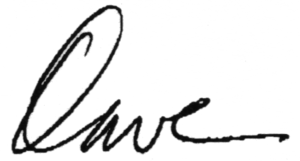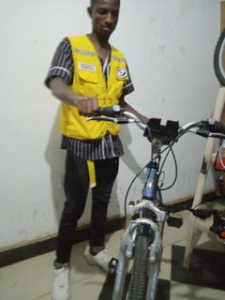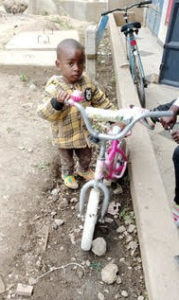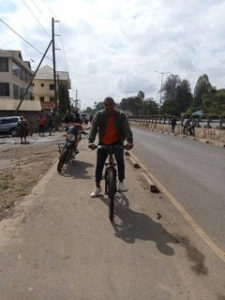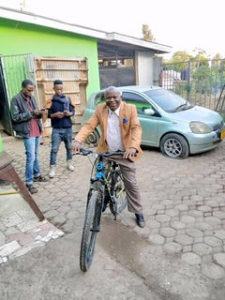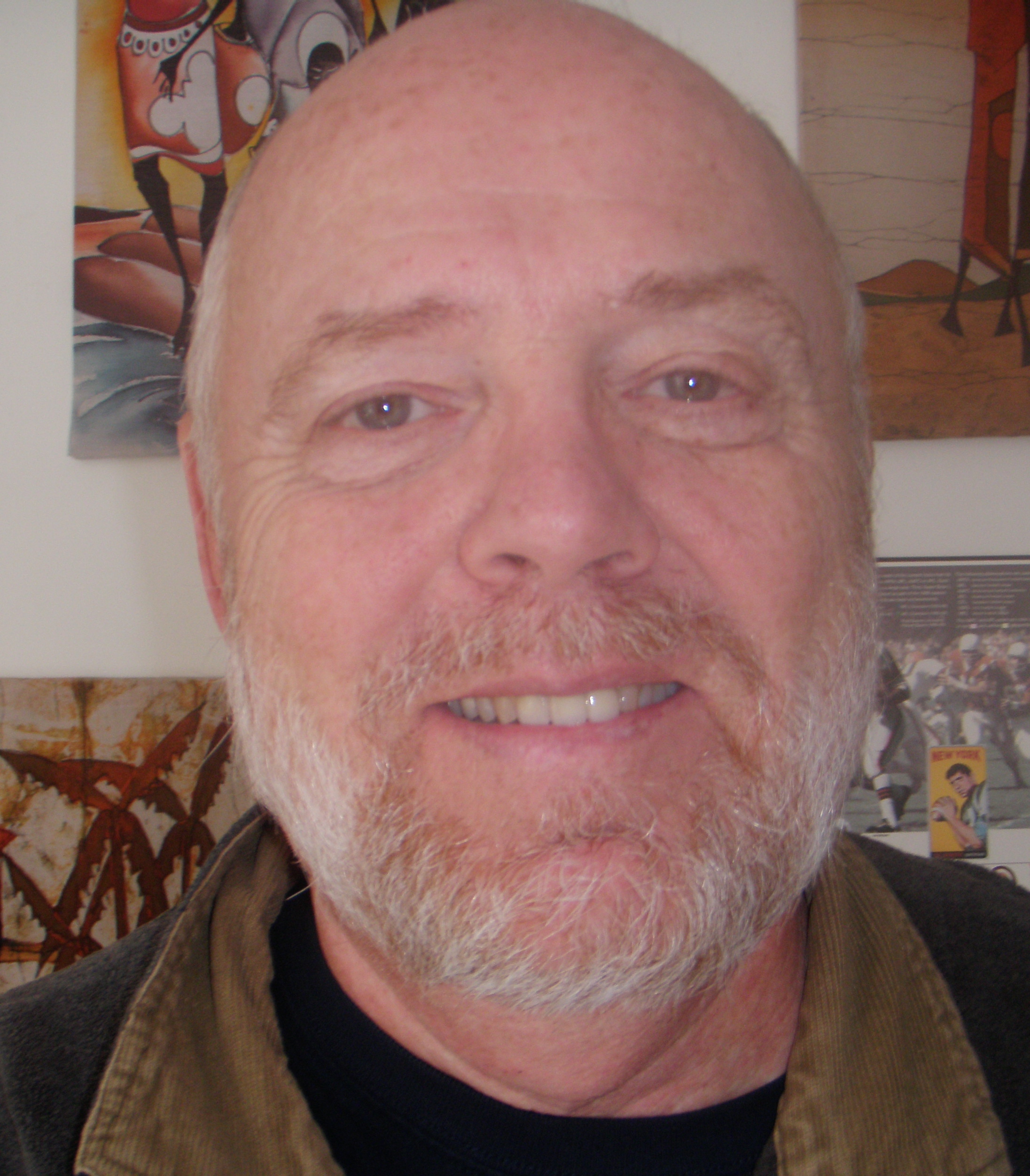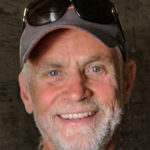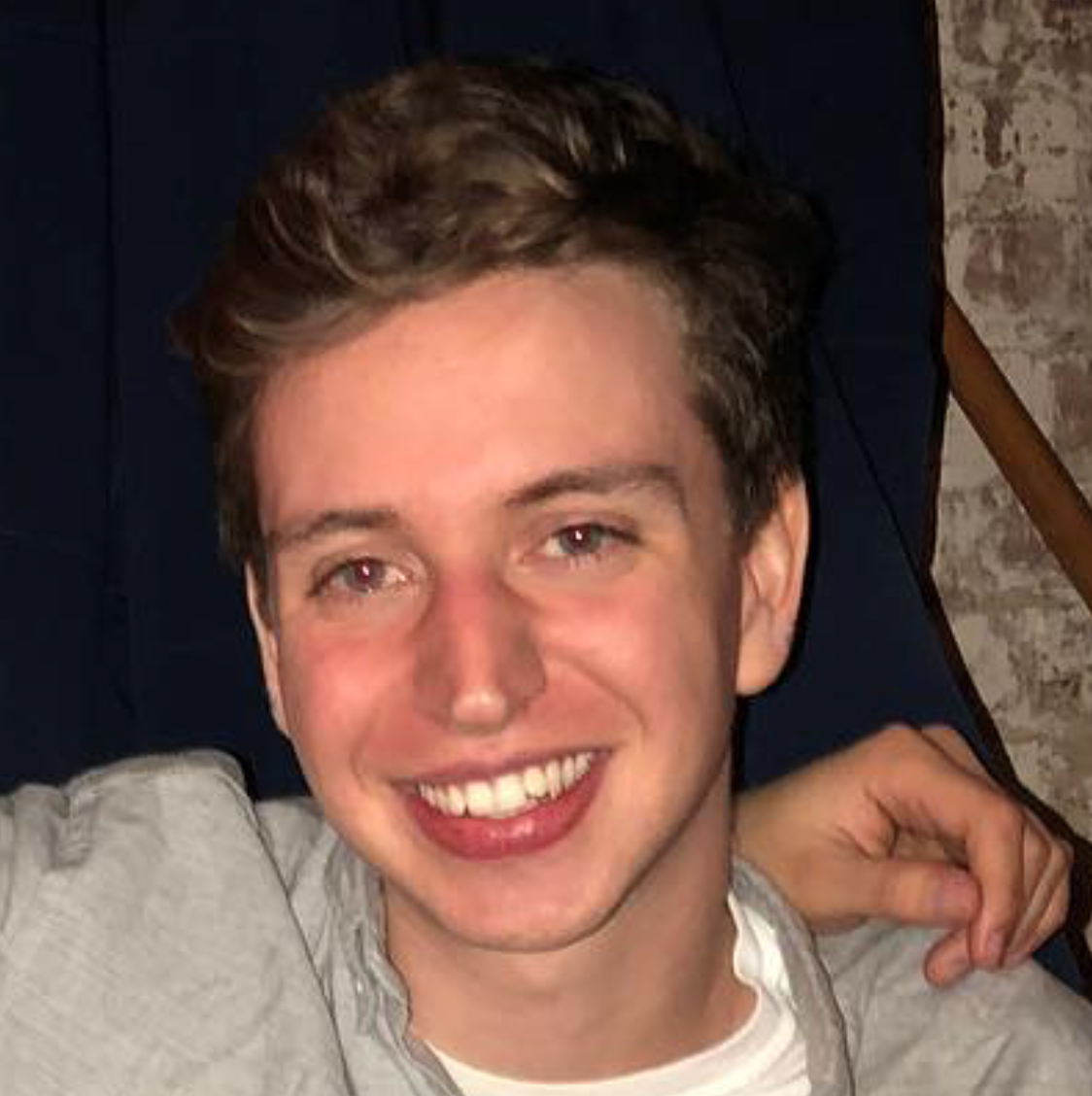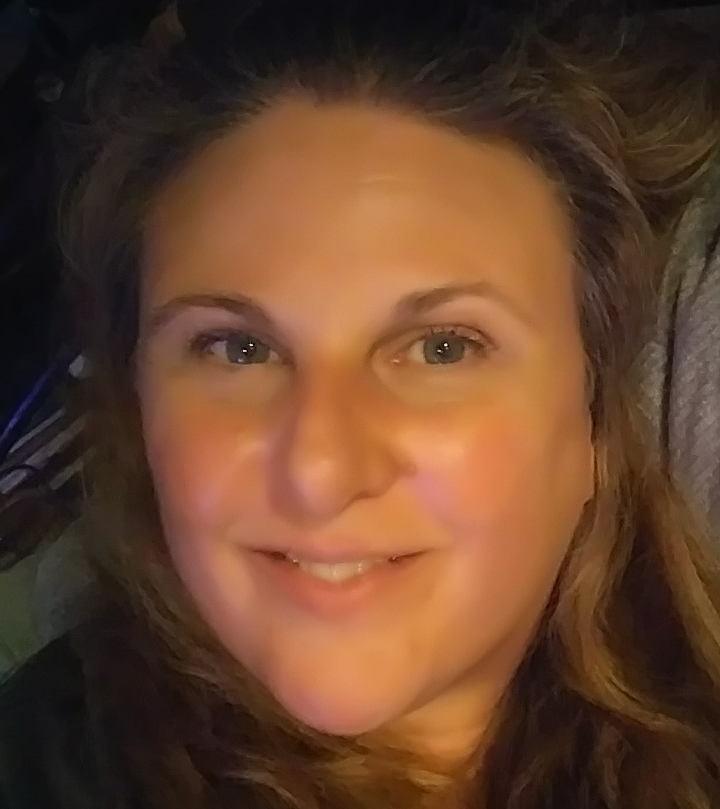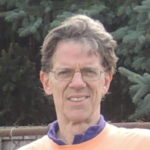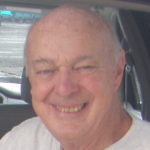Fall 2021

SUMMER CAMP IN ALBANIA
By Alan Schultz
Fall 2021 Newsletter
On August 19, 2021, on behalf of Pedals for Progress, I had the great privilege to be sent to Albania to visit our partners at Ecovolis, to meet with Ened Mato and the rest of his extraordinary team to get to know them and discuss their operations.
For the past eight months I have been working closely with Dave, Gary, and the rest of the team at P4P, as the newly elected Vice President of Operations. Working for Pedals for Progress since high school has always been a joy for me. The work we do here is truly inspirational and makes any day of hard work loading a container well worth it. I was offered the full-time position and instantly knew it was something I wanted to take on. I was extremely excited to accept the position to dedicate more of my time and skills to our cause of shipping bikes and sewing machines to motivated people in the developing world.
Dave was very aware of the biggest flaw in my resume (and life experience) when hiring me for a larger role in an international organization like P4P. My lack of travel. I had never left the country. The furthest north I had been was Boston, furthest south was the Outer Banks, furthest west was Central Pennsylvania and furthest east was swimming at the Jersey Shore. Lewis and Clark would be ashamed of my lack of westward expansion. Dave knew I needed to learn from the world, to get a better understanding of our mission and what we’re up against.
I woke up one morning at the end of June to an email with the Subject line: Crazy Idea. I opened it and read a thread of messages between Dave and Ened, asking if he’d be interested in hosting me at his summer camp in Jale for a week to give me the opportunity to learn about the world by seeing it on my own. Ened was instantly on board with the idea and more than happy to host me. I was in shock, filled with excitement, anxiety, and joy.
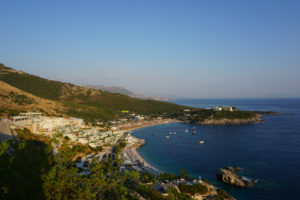
Fast forward to mid-august, I was boarding a plane to Albania alone with a backpack and newly acquired passport on my first journey out of the country thinking “what did I get myself into.” I had often dreamt of going abroad. The experience didn’t feel real stepping outside onto the tarmac at Tirana International Airport. I was picked up by Ervin, a long-time employee for Ecovolis. The four-hour trip from Tirana to Jale was spent getting to know Ervin and the work Ecovolis has done for the capital city of Tirana. Their biggest program is a bike sharing initiative where residents can rent bikes for a very small fee to navigate the city. This greatly helps people commute while alleviating some of the traffic of the small but bustling city. To better accommodate cyclists, Ecovolis also has been pushing the city to create, grow, and maintain bike lanes and other infrastructure that will make it much safer to travel throughout the city. Ervin expressed the great need for bicycle safety and advocacy to draw the public’s trust to this method of transportation. This is something that is essential for any city that wants to successfully reduce traffic and emissions made by cars and buses. Ecovolis does not simply distribute bikes, but is making a difference by having bicycle transportation not just reliable and available, but sustainable and appealing to the public.
Ecovolis in Albania is a fascinating organization as they have a true passion for environmentalism on several fronts. As we made our way to Jale, we traversed breathtaking mountain views overlooking wonderfully blue seafront. Ervin was describing the eco-tourist campground that we would be staying at for the week, one of the many programs Ecovolis is involved with. He had been there for two months prior, and came to Tirana to pick me up and collect more tents and other supplies for the camp. It was one of the many initiatives they take part in to return to nature and help strengthen people’s connection to the natural world. In the off season while not at the camp, they return to Tirana for their bike initiative while also working on other projects like planting trees with local volunteers to revitalize the diminished forest in Lurë.
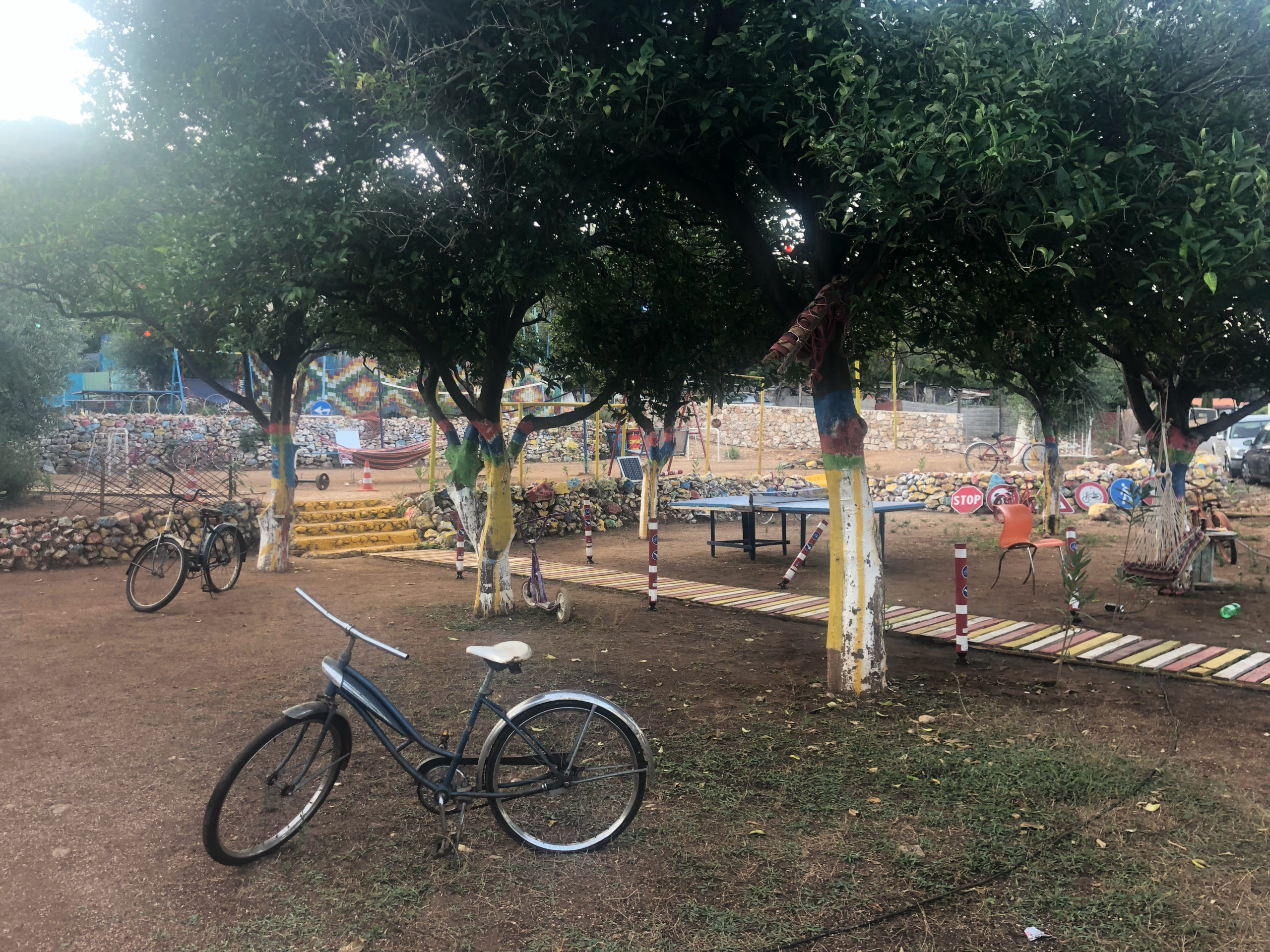 When we arrived at camp, I was blown away at what they have created. Two blocks away from the beautiful beachfront was the entrance to the camp that scaled the steep mountain. It was broken up into several levels. Entering camp at the bottom-most level there was a volleyball and soccer court where young people can play games and relax. A handful of bikes were positioned here and available to anyone at camp, allowing them to ride around the small town and get to the beach. Climbing the stairs that led up to the various levels there were some RV-campers and other common areas. On the third level there was an open-air kitchen and a large area with plenty of tables and chairs for people to gather and eat meals. Further up the mountain, following the rocky steps, I approached the several levels of campground with 150 or so tents placed beautifully under the abundance of olive trees. Ping pong tables, common areas, a bar with drinks, and fire pits were also sprinkled about the area. Painted wooden paths and fences brought an elevated level of color to the already vibrant camp. It was an intimate community with plenty of friendly faces with welcoming smiles.
When we arrived at camp, I was blown away at what they have created. Two blocks away from the beautiful beachfront was the entrance to the camp that scaled the steep mountain. It was broken up into several levels. Entering camp at the bottom-most level there was a volleyball and soccer court where young people can play games and relax. A handful of bikes were positioned here and available to anyone at camp, allowing them to ride around the small town and get to the beach. Climbing the stairs that led up to the various levels there were some RV-campers and other common areas. On the third level there was an open-air kitchen and a large area with plenty of tables and chairs for people to gather and eat meals. Further up the mountain, following the rocky steps, I approached the several levels of campground with 150 or so tents placed beautifully under the abundance of olive trees. Ping pong tables, common areas, a bar with drinks, and fire pits were also sprinkled about the area. Painted wooden paths and fences brought an elevated level of color to the already vibrant camp. It was an intimate community with plenty of friendly faces with welcoming smiles.
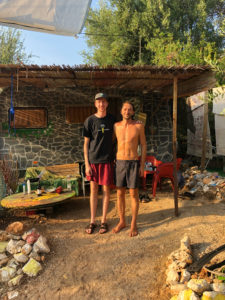
Settling in, I was finally able to meet Ened, the lead organizer of Ecovolis. He instantly made me feel at home and was extremely hospitable. He told me more about the camp and the many things him and his team are involved with throughout Albania. The camp was set up in the early 2000s with the idea of bringing eco-tourism to Albania to build the country’s economy in an honest, fair, and sustainable manner. Ened is a true trailblazer, inspiring several other camps up and down the coast for others with like-minded ideas of providing people with peaceful eco-tourism opportunities. Ened’s camp has the capacity to hold up to two-hundred people with full amenities. He hosts various youth programs and students throughout the summer. Travelers and other youth from several different parts of Albania and Kosovo are also welcomed and bused to and from the camp. For a small fee of US $7 a day, each tenant has access to a tent, showers and running water, bathrooms, and breakfast and dinner. There is access to an on-site bar with espresso, water, and flavored drinks that cost less than they would at the beach. These funds supplement the camp allowing them to continue to buy necessary food and supplies.
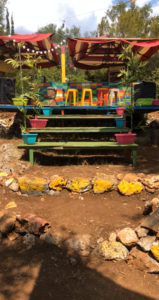
Ened explained that the growth of the camp, in its 20th year, has been very promising and stronger than ever. The entire experience is a great way to remove oneself from the typical consumerist vacation that many people grapple with. Cell phones and social media use are frowned upon to the extent of one sign encouraging people to have conversation eye to eye. The culture at camp revolved heavily around companionship and camaraderie. Camp felt tight knit, as if everyone knew everyone.
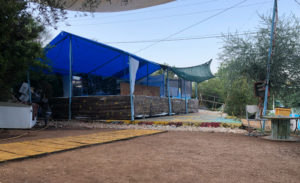
One night, Ened and I were sitting a bit removed from the campfire as many of the other campers surrounded it while listening to a performer sing songs playing an acoustic guitar. We were talking about the mission of Ecovolis and the reason behind the camp. Albania’s history is very dense, especially in the last 50 years as they have grappled with corruption, civil war and reconstruction. Ened has a deep desire to be able to create and maintain a community – his country – of people dedicated to peace and environmentalism. He is proud of what he has created as the camp reflects these desires to create a community of people that are self-sufficient and making efforts to remove themselves from the rat-race of the 21st century. Paraphrasing, Ened said “take for example these kids, what they are doing is so anti-system, they are young and can go down to the bars down below, but instead choose to be here singing around the campfire under the stars.” He continued to explain his greater mission of using the bikes we send him as “soldiers in a bigger fight” against the various forms of corruption within the country. They are used as tools to mobilize the community, to allow them to get to where they need to be, to build something from the ground up that they can all call home.
The people at camp certainly follow Ened’s vision. Among the people at camp I came across a group of friends close in age to myself that stand out most in my mind. They were bused down from Kosovo and invited me to have espresso with them down at the beach one morning. Like any new group of friends, we talked about our backgrounds, hobbies, interests and what we do for a living. I told them about Pedals for Progress and while they did not work for Ecovolis, and were in Jale for a short vacation, they instantly gravitated to and understood our mission. It was a moment of clarity for me, and a sobering reminder of what we do. They didn’t have the same kind of interest in our organization that people my age have here in the United States have for P4P. It was through a different lens I saw how important our work is. They instantly recognized how useful a bicycle can be for someone. They thought of how important a tool like a bicycle can be for the people back home in Kosovo. When my friends from the United States see a bicycle, they do so as a product of leisure or exercise. Abroad, in a developing country, it is much more. I was blown away seeing the agency this group of guys had when they heard more of our program. They explained how Kosovo and Albania, like many countries in the Balkans, are struggling to build themselves, many being newly formed governments. They know that the bicycle is a way to achieve a fulfilling, successful life with long-term security. They saw the tool and thought of their homes and the people they care about, people who can use that tool to greatly change their lives.
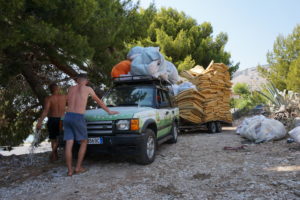 Throughout the week, staying and working at the camp, I was constantly surrounded by hard-working people dedicated to a greater cause. Ervin, who I spent the great majority of the trip with, was a well of knowledge and inspiration. One day, Ervin, the chef at the camp Ari, and I went a few towns over to pick up mattress pads to bring back to camp. They were in storage located behind a group of bungalows accessible only by a tight winding path that went up the mountain. We loaded over 200 foam pads onto a flatbed parked at the bottom of the road. Relentlessly hauling ten mattresses at a time, Ervin and Ari showed an energy that never flagged. Ervin’s mindset is captured by this image and another moment when we were paddling a canoe in the sea. We were paddling against the wind to access a small private beach. The closer we got the harder it was to paddle, yelling to me in the back he said “Do you see the beach? We must keep going! We can see the beach, so we can go touch the beach!” It is that mentality that stuck with me the most. Ervin and the rest of the people at Ecovolis can see the beach – they see a community that can be better, that can serve a purpose and be peaceful. They are pushing to touch that beach and make it a reality.
Throughout the week, staying and working at the camp, I was constantly surrounded by hard-working people dedicated to a greater cause. Ervin, who I spent the great majority of the trip with, was a well of knowledge and inspiration. One day, Ervin, the chef at the camp Ari, and I went a few towns over to pick up mattress pads to bring back to camp. They were in storage located behind a group of bungalows accessible only by a tight winding path that went up the mountain. We loaded over 200 foam pads onto a flatbed parked at the bottom of the road. Relentlessly hauling ten mattresses at a time, Ervin and Ari showed an energy that never flagged. Ervin’s mindset is captured by this image and another moment when we were paddling a canoe in the sea. We were paddling against the wind to access a small private beach. The closer we got the harder it was to paddle, yelling to me in the back he said “Do you see the beach? We must keep going! We can see the beach, so we can go touch the beach!” It is that mentality that stuck with me the most. Ervin and the rest of the people at Ecovolis can see the beach – they see a community that can be better, that can serve a purpose and be peaceful. They are pushing to touch that beach and make it a reality.
One of my main jobs here at P4P is loading our containers. Before my trip to Albania, closing the doors and putting a seal on the container, with the bikes officially on their journey to a new country, the destination always seemed vague and distant. Being able to interact with people who receive our bikes has closed that gap and has given me a better understanding of the extent of our mission. It was an amazing experience to be thrown headfirst into the world, beyond the two square miles of High Bridge, New Jersey, to face a previously unseen part of myself and the world. It’s motivating to know the groups we work with have a deep desire to change the communities they love. Traveling to Albania, the concept of mobility was hard to escape. It’s intrinsic to what we do, as the bicycle gives people the opportunity to be mobile, to go beyond what they are capable of on foot. When you have mobility, you have the opportunity to create change. This change is multifaceted and goes beyond simple transportation to work and school. It includes personal and private change. Cycling gives personal freedom to expand your reach within your community, to be active with your friends and family. To be able to connect with the people in your life, to see them eye to eye and live comfortably beside them, gives a community greater strength to push forward and grow on so many different levels. While this has always been a core tenet of Pedals for Progress, it resonated at a much deeper level to me after this trip. It was truly an honor to see the camaraderie, companionship, hard work, and passion I came across during my time in Albania, generated from people who simply want to improve the world.
PRESIDENT’S MESSAGE, FALL 2021
It has been such a tumultuous year. Pedals for Progress and Sewing Peace have been working within our pandemic limitations. It is hard to sum it all up. Maybe it should be “the mission continues”. In our fiscal 2021 we got back to our 2019 production levels. 2022 should be even better.
P4P became 30 years old this year. I have had the immense pleasure of being President of P4P for 30 years. Parts of the job that require physical ability I can no longer have. Over the last 10 years I’ve gotten a lot of help from younger folks but it is time to start a transition to a new team with a much younger, more vibrant President. We have completed three decades but we now must plan for the next few.
Alan Schultz loaded containers all through high school. Went off and got a Masters degree and graduated into the teeth of a pandemic. For over a year he has been managing the loading of the containers: five men, four hours, 20,000 pounds. I was impressed with his management skills with those work crews.
I asked him this spring if he would like a greater role in the organization and he said yes, what would it be, and I suggested it be President. You have seen from the newsletters his excellent writing skills. Another important element of the job is public speaking; his public speaking is as good as if not better than his writing skills. I’ve already mentioned his exceptional skill managing a work crew.
We plan an 18-month transition period that started in April 2021. Alan has been my shadow since then. This fall he’ll follow Gary Michel, going to collections with Gary. We always need multiple people to run collections and no one will teach him how to run collections better than Gary.
Alan has been watching the international shipping arrangements, but I will involve him more in the actual Magic of having a 40-foot container arrive at our loading dock and then reappear halfway around the world, somehow getting through customs in a partner country. In the spring of 2022 he will start moving the paperwork for the containers and I will be his shadow.
Then in the fall of 2022 he’ll begin all the messy details of running a business: insurance companies, bookkeepers, budgets, accountants, federal and state tax authorities, state registrations, commonwealth registrations, bank accounts, …
In December 2022 Alan will be the president. I am still on the board of trustees. I don’t plan on going anywhere and I only live four houses up the street from Alan so he can involve me in whichever way he wishes. It will be a decision the new president has to make but I will be here to help in any way I can.
Pedals for Progress should have been cash positive in fiscal 2021 but we were slightly in the red because we have been carrying an extra payroll burden for 8 months. This is the cost of a succession plan. For fiscal 2022, for the first time ever, our budget shows a −$18,000. P4P is quite self-sufficient but really can’t afford an extra salary spot. Yet that is the cost to continue for decades more. For the next 12 months we are just going to have to accept that added payroll cost so that we can have a smooth transition into the future.
I had not planned on retiring, in part because I didn’t think there was any possibility of anyone else taking on the job. I had assumed we would just fold the organization at some point. When I realized that there was an alternative and a potential candidate who could keep P4P going, it was an opportunity too good to miss.
I want to express my personal deep gratitude for all the support you have given P4P over the years. I want to assure you that the mission has not changed. Alan will continue this vital work for decades to come. Please support him and the organization in the future.
Protected: GREAT MEN I HAVE KNOWN, PART 1: BOB GLEASON
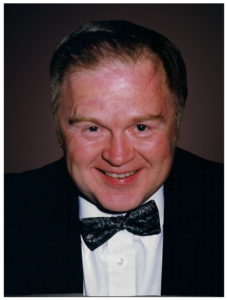 I started Pedals for Progress in 1991 in my late 30s. I ended up recruiting a number of recent retirees in their early 60s who were looking for a second career. They became the core of our bicycle collections. I am now 69. We have lost many of these important cogs in the wheel.
I started Pedals for Progress in 1991 in my late 30s. I ended up recruiting a number of recent retirees in their early 60s who were looking for a second career. They became the core of our bicycle collections. I am now 69. We have lost many of these important cogs in the wheel.
In the next couple of newsletters I would like to honor some of these good friends and instrumental movers in the success of Pedals for Progress. I did not create this organization by myself. I have had a lot of help, from many role models.
Here I would like to speak about Bob Gleason, who passed away on October 1st, 2021. (Obituary) Entrepreneur, bike shop owner, such a good soul. Bob built the first BMX course in New Jersey to promote the sport. He served the greater Freehold, New Jersey, area as a predominant bike shop for decades.
Through his bike shop he offered trade-ins, at his loss, which he donated to P4P. Late in life he became interested in antique bikes and he helped market the rare antique bikes we sometimes receive.
Bob always had a smile on his face and a chuckle in his speech. He was a truly jolly person and you came away from meeting him with your day improved.
Men like Bob Gleason have inspired me to be a better person. To work harder and longer for the disadvantaged. They became my role models.
PEDALS FOR PROGRESS IN RWANDA, FALL 2021
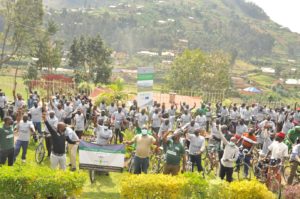 Rwanda Wildlife Conservation Association uses bikes to help protect and manage important wetland areas. Rugezi Marsh is a 6,735 hectare wetland protected by RAMSAR. We have a team of 50 community Marsh Rangers patrolling the wetland and watching out for activities that are not allowed and will destroy the marsh habitat, such as grazing livestock, cutting down trees in the buffer zone, hunting wildlife or cutting grass.
Rwanda Wildlife Conservation Association uses bikes to help protect and manage important wetland areas. Rugezi Marsh is a 6,735 hectare wetland protected by RAMSAR. We have a team of 50 community Marsh Rangers patrolling the wetland and watching out for activities that are not allowed and will destroy the marsh habitat, such as grazing livestock, cutting down trees in the buffer zone, hunting wildlife or cutting grass.
To improve the management and law enforcement of this important wetland, we also work in close partnership with local leaders around the marsh.
With the bikes from Pedals for Progress we were recently able to distribute bikes to all local leaders working near Rugezi Marsh – a total of 187! They were so happy to receive these bikes. The bikes will make a big difference in their communities and will increase collaboration with the Rangers.
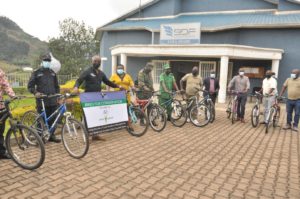 During the event, one leader made a speech about the significance of the bikes and how much they were appreciated by him and his colleagues. He described how the projects at Rugezi are life changing. He believes that the bike will help him respond quickly when Rangers call, especially during their patrols when they need support in resolving illegal activities. The bikes will also help in daily life, providing transportation to the market or to church. Having a bike will also save money that they might spend on public transport and save time getting where they need to go.
During the event, one leader made a speech about the significance of the bikes and how much they were appreciated by him and his colleagues. He described how the projects at Rugezi are life changing. He believes that the bike will help him respond quickly when Rangers call, especially during their patrols when they need support in resolving illegal activities. The bikes will also help in daily life, providing transportation to the market or to church. Having a bike will also save money that they might spend on public transport and save time getting where they need to go.
Once the local leaders have started using their new bikes, we will check in with them to better understand the impact they have had on their job roles and family life. Thank you to Pedals for Progress for helping support conservation at Rugezi Marsh in Rwanda.
REPORT FROM UGANDA, FALL 2021
On behalf of the Mityana Open Troop Foundation, I have compiled a progressive report for May to October 2021.
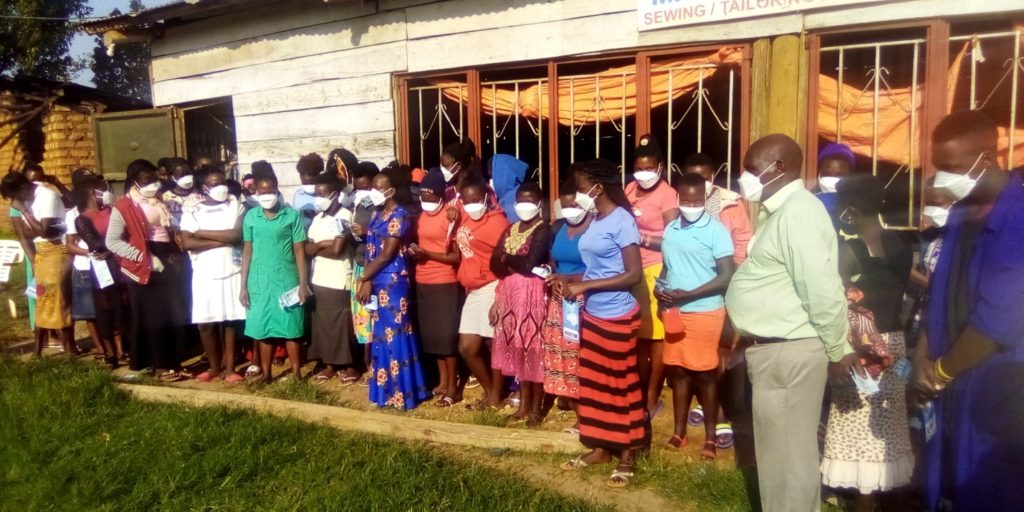 Mityana Open Troop Foundation is a registered Community Based Organization, with a Vocational Skills Training Centre, which recruits and trains vulnerable youths, mostly young girls formerly selling sex for survival and girls expelled from schools due to teenage pregnancies. We teach our students sustainable vocational skills. Before the closure of all institutions due to Covid-19, the school had a total enrollment of 92. Since the inception of vocational skills training at our centre in 2007, a total of over 800 have graduated. Some got employed while others set up their own workshops. Every graduate of our program is given a sewing machine from Sewing Peace, USA. Without equipment, the graduation certificate is no help, as 90% of graduates can’t afford tools.
Mityana Open Troop Foundation is a registered Community Based Organization, with a Vocational Skills Training Centre, which recruits and trains vulnerable youths, mostly young girls formerly selling sex for survival and girls expelled from schools due to teenage pregnancies. We teach our students sustainable vocational skills. Before the closure of all institutions due to Covid-19, the school had a total enrollment of 92. Since the inception of vocational skills training at our centre in 2007, a total of over 800 have graduated. Some got employed while others set up their own workshops. Every graduate of our program is given a sewing machine from Sewing Peace, USA. Without equipment, the graduation certificate is no help, as 90% of graduates can’t afford tools.
Students are trained for 2 years in Sewing & Fashion Designing, Hair Dressing & Weaving, Motor Vehicle & Cycle Mechanics, Carpentry & Joinery, or Metal Fabrication.
Every year, there are 3 training terms of 3 months each; for each term the centre recruits whoever wishes to join.
Achievements
-
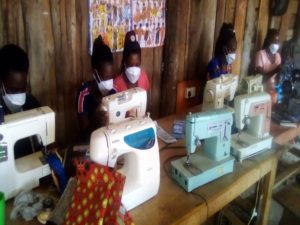
Madison Sewing Workshop The Sewing Workshop floor has been renovated and we installed 2 cutting tables with a micro loan from M/s Ivonne Reilly Sencebe of the USA. The workshop floor had been dusty, not conducive to learners and damaging sewing machines. This Madison Sewing workshop was constructed with support from Madison Ardizzi of Canada.
- The project sewing shop has been producing face masks and selling them at a price lower than our competitors’.
-
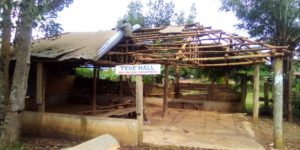
Tyne Hall Renovation The Tyne Hall hair dressing workshop roof has been renovated with support from Mr. & Mrs. Jane Louise Colin Neil Dippie, of the UK. The roof has been leaking for a long time. The construction of Tyne Hall workshop floor and boundaries was sponsored by Mr. Chris James Eldridge of the UK.
Challenges and Limitations
- By the second lockdown and school closure in mid-June 2021 due to Covid-19, a number of students had not fully paid their school fees. All training institutions in Uganda had been under lockdown since March 2020. This has caused serious loss of income for our project!
- The Organization still encounters challenges in raising funds for shipping Sewing Machines from Sewing Peace USA.
- The Organization lacks a computer, printer, and photocopier, which we need to print end-of-term exams and other office documents. Currently all computer work is taken to town.
- The project needs a computer lab with internet access, to enable students to find dress fashions, learn computer skills, and get Health information. In addition, this computer lab would be used by our community volunteers to access the Ministry of Health for health-related issues.
- The project requires a new embroidery machine that can use a USB drive and that can run faster. The current machine is slow and often needs routine maintenance and servicing.
- The Organization requires office furniture and a staff room, as instructors don’t have a place to sit and keep their kits.
- The Training Centre lacks clean water. There is a very small (2000-liter) water tank, which lasts 2 days. Then students have to go on foot 1 km in search of water from unprotected water sources. This has resulted in many cases of Typhoid.
- We have many cases of malaria among project trainees, as they lack mosquito nets.
- Our project lacks a toilet for boys. Currently boys and girls share one pit latrine, which is not recommended by the Ministry of Education.
- The project lacks an incinerator, where sanitary pads and other wastes can be burnt easily.
Community Impact
- The Mityana Open Troop Vocational Skilling Project offers affordable training to school dropouts from our communities, including unemployed youths. The project trainees come from the 6 surrounding districts: Mityana, Mubende, Kiboga, Kasanda, Kyankwanzi, and Hoima. The non-formal skills training we offer has very much benefited parents whose children have dropped out of school, as most institutions in the area offer only formal education only.
- Over 800 trainees have graduated since our inception in 2007. These graduates go back to their communities and set up their own workshops, passing along their acquired skills to fellow youths who didn’t join our project.
- The community can also buy inexpensive goods and services from trainees in the carpentry workshop and the sewing project, where we make uniforms and offer sewing repair services.
- Our sewing shop also offers embroidery services to schools formerly traveling to Kampala.
- The Mityana Open Troop Foundation is the only shop in the area delivering high quality used sewing machines at inexpensive prices. The machines are from Sewing Peace USA. Many schools and tailors in the area have been supplied with these machines.
Way Forward and Recommendations
- We are fundraising for a new 2-classroom block, to enable us to create a conducive training environment and have room for more students.
- We need a new toilet for boys, who currently share facilities with girls.
- We need embroidery machines with USB input, as the one we have is very slow and requires mechanical servicing all the time!
- We need an incinerator for burning sanitary pads and other wastes.
- We welcome volunteers who can teach sustainable skills to our youths. We would like to partner with similar vocational training institutions elsewhere in the world. This will help us learn how they operate. Plus it will help our Ugandan youths create friendships with fellow youths and learn about their cultures.
- We are organizing a Christmas children’s party for December 27th, with guest speakers, drinks, cakes, biscuits, music, and gifts.
Conclusion
In conclusion, on behalf of the Mityana Open Troop Foundation, I extends our sincere thanks to the following great friends and partners: Mr. Chris Eldridge, Mr. Colin Dippie & Mrs. Jane Louise Dippie, Mr.Nino Ardizz, M/s. Madison Ardizzi, Holly Williams, M/s. Ivonne Reilly Sencebey. You have all been so supportive to our organization, during this pandemic lockdown and before. This has been and still is a very challenging season of limited funds and people losing their jobs.
I also extend our thanks to Mr. David Schweidenback, President of Sewing Peace, and the generous communities of the USA, who have been donating high-quality refurbished sewing machines to our needy Ugandan communities. Please, the used sewing machines which seem unimportant in the USA have uplifted our communities, changing peoples’ lives by creating a daily source of income. Thanks to all the volunteers involved in the collection of sewing machines and bicycles.
Please Continue Giving a Hand Up, Not a Hand out.
Stay safe from the Covid-19 Pandemic.
God Bless You.
Merry Christmas & Happy New Year 2022
Yours,
Mathew Yawe, Executive Director, Mityana Open Troop Foundation
REPORT FROM VERMONT, FALL 2021
By Alan Schultz
Fall 2021 Newsletter
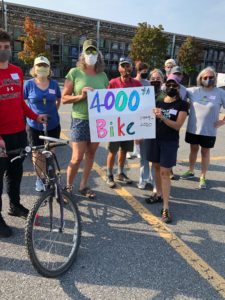 “Freedom and Unity” is the motto of the great State of Vermont. Much of what we do at Pedals for Progress is based on this exact principle. Our goal is to send used bicycles and sewing machines to motivated people in the developing world in the hopes that they can have the freedom to get to where they need to be, creating a better life for themselves. This goal requires a great amount of unity here in the United States. We cannot do what we do without the help from hundreds of dedicated people throughout the country. The Green Mountain Returned Peace Corps Volunteers (GMRPCVs) of Vermont are some of our most productive domestic partners. Every year for 22 years they’ve sent bikes and sewing machines from 300 miles away.
“Freedom and Unity” is the motto of the great State of Vermont. Much of what we do at Pedals for Progress is based on this exact principle. Our goal is to send used bicycles and sewing machines to motivated people in the developing world in the hopes that they can have the freedom to get to where they need to be, creating a better life for themselves. This goal requires a great amount of unity here in the United States. We cannot do what we do without the help from hundreds of dedicated people throughout the country. The Green Mountain Returned Peace Corps Volunteers (GMRPCVs) of Vermont are some of our most productive domestic partners. Every year for 22 years they’ve sent bikes and sewing machines from 300 miles away.
FedEx, another generous domestic partner, ships the bikes at no charge from Vermont to our warehouse in New Jersey. In 2020, FedEx delivered the 4000th bike from Vermont.
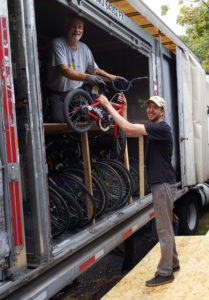 The GMRPCV operation, led by Joanne Heidkamp, Paul Demers, and Bob Thompson, along with the rest of the volunteers, requires a great deal of hard work and dedication. We are happy to report that, this year alone, the members of the Green Mountain Returned Peace Corps Volunteers collected 312 bikes and 204 sewing machines from hundreds of Vermonters throughout the state. They held collections on Friday 9/24 in Montpelier and on Saturday 9/25 in Burlington. We here at Pedals for Progress would like to share a little bit about what they have done over the years and give thanks to the many people and groups involved with this difficult endeavor.
The GMRPCV operation, led by Joanne Heidkamp, Paul Demers, and Bob Thompson, along with the rest of the volunteers, requires a great deal of hard work and dedication. We are happy to report that, this year alone, the members of the Green Mountain Returned Peace Corps Volunteers collected 312 bikes and 204 sewing machines from hundreds of Vermonters throughout the state. They held collections on Friday 9/24 in Montpelier and on Saturday 9/25 in Burlington. We here at Pedals for Progress would like to share a little bit about what they have done over the years and give thanks to the many people and groups involved with this difficult endeavor.
Getting the word out about our collections is always the biggest hurdle when organizing an event. What makes a successful collection is not simply stating that there will be a bike collection, but communicating to the public exactly what the collection is for. The GMRPCVs have been able to nail it year after year. MyNBC5, the local NBC station, ran a fantastic news piece that does exactly that. It perfectly showcases what they aim to do and where the bikes will be going and the lasting impact the bikes will have on the communities they are being sent to. Press releases like this not only spread the word, but convey infectious motivation that encourages people to come out to the collections. Here is the two-minute video from MyNBC5.
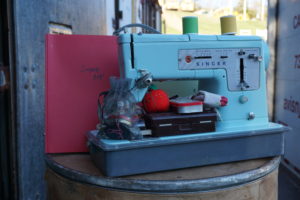 Vermont’s collections are particularly impressive because of the large number of sewing machines collected. Most of the machines are collected by Mary O’Brien, who works in the solid waste management department of Windsor County. She collects machines all year round, cleans, oils, and tests them. She uses pretty cloth, sometimes handkerchiefs or napkins, to hold sewing notions, a pin cushion, and reading glasses, and puts it all together in a kit for each machine. She also includes user manuals for the machines. The machines and their accessories must be astonishing to our overseas partners who get them.
Vermont’s collections are particularly impressive because of the large number of sewing machines collected. Most of the machines are collected by Mary O’Brien, who works in the solid waste management department of Windsor County. She collects machines all year round, cleans, oils, and tests them. She uses pretty cloth, sometimes handkerchiefs or napkins, to hold sewing notions, a pin cushion, and reading glasses, and puts it all together in a kit for each machine. She also includes user manuals for the machines. The machines and their accessories must be astonishing to our overseas partners who get them.
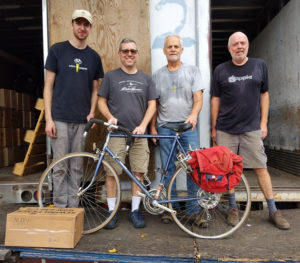 This year, Mary also donated her classic, dearly loved road bike, which she had owned for most of her life and which she rode across the US in 1981. The bike has a personality of its own, reflecting the life-long activist and humanitarian that rode it. The bike is equipped with red panniers and an “anti-nuke bicyclist” sticker. The well-loved bike that has seen a lifetime adventure will continue its journey in its new home in Guatemala. It will double its life as a bicycle and see even more of the world while providing someone with a valuable means of transportation.
This year, Mary also donated her classic, dearly loved road bike, which she had owned for most of her life and which she rode across the US in 1981. The bike has a personality of its own, reflecting the life-long activist and humanitarian that rode it. The bike is equipped with red panniers and an “anti-nuke bicyclist” sticker. The well-loved bike that has seen a lifetime adventure will continue its journey in its new home in Guatemala. It will double its life as a bicycle and see even more of the world while providing someone with a valuable means of transportation.
It is truly inspiring to see the great work that The Green Mountain Returned Peace Corps Volunteers have done for Pedals for Progress and the countless people and families associated with our international partners. We would again like to thank everyone involved. This year’s collection was certainly one worth celebrating. We greatly look forward to continuing this fantastic relationship and we are filled with excitement for next year’s collection.
NOTES FROM TANZANIA, FALL 2021
We just got four short notes from our partner in Tanzania, The Norbert and Friends Missions.
My name is David. I am from Njiro Arusha Tanzania. I am so thankful to God for getting a bicycle for exercise and also as a tool to enable me to ever be in my workplace. Congratulations to the P4P Project under The Norbert and Friends Missions for the excellent work you are doing to help us young people by providing work tools such as bicycles so that we can build a body and use a bicycle as a means of transportation.
My son loves cycling and has now been crying for P4P bikes for him to exercise. I wish I could continue to pay a little more so that my son can exercise using this bike, which is his size.
My name is Rafael. During this corona period I was lucky enough to get a bicycle from the P4P Center under The Norbert and Friends Missions in Arusha. The bike has helped me get to work on time but most of all my health has improved and I am currently not having trouble breathing. My chest feels strong.
My name is Dr Norbert Mbwiliza. I am the founder of The Norbert and Friends Missions. I have been fortunate to be among the project beneficiaries who have received a practice bike from the P4P Project. Fortunately I have found a bicycle with which we are encouraged to exercise in Tanzania as part of the fight against Covid-19. As you can see, my health is improving thanks to the exercise I get by cycling. I thank my friend David and the entire P4P team for your great support, which has helped us earn an income by selling bicycles and sewing machines. Through your support the incomes of Tanzanians are strengthened.
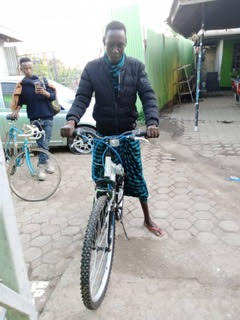
P4P/SP BOARD OF TRUSTEES
Jamie Acosta
Jerry Agasar
John Alexander, Treasurer
Daryl Detrick
Ann Fitzgerald
Sarah Jannsch
Richard Millhiser, Chair
David Schweidenback, President & CEO
Casey Walsh
Andrew Williams
Bob Zeh, Secretary
ACTIVE PARTNERS AS OF NOVEMBER 2021
( Map)
Map)
ALBANIA, Tirana, PASS/EcoVolis, community development: 8,300 bikes (2010 – 2021), 464 sewing machines (2010 – 2021)
CAMEROON, Limbe, Rising Hope for Change, community development: 462 bikes, 259 sewing machines (2013 –2021)
GUATEMALA, Chimaltenango, Fundacion Integral de Desarrollo Sostenible y Medio Ambiente (FIDESMA), small-business promotion: 12,034 bikes (1999 – 2022), 406 sewing machines (2003 – 2022)
RWANDA, Kigali, Rwanda Wildlife Conservation Association, community development: 503 bikes (2021), 43 sewing machines (2021)
SIERRA LEONE, Kenema, Village Care Initiatives, community development: 959 bikes (2003 –2008), 102 sewing machines (2008 – 2021)
TANZANIA, Arusha, The Norbert and Friends Foundation, community development: 1352 bikes (2019 – 2021), 537 sewing machines (2019 – 2021)
TOGO, Vogan, Association Défi et Révolution de la Vie Rurale, economic development: 1,439 bikes (2020 – 2021), 334 sewing machines (2019 – 2022)
UGANDA, Mityana, Mityana Open Troop Foundation, community development: 556 sewing machines (2005 – 2022)
Shipment totals for a country include shipments to previous partners as well as to active partners in that country.
Shipments of bicycles since 1991 have gone to other partners in Appalachia, Cameroon, Colombia, the Dominican Republic, Ecuador, El Salvador, Eritrea, Ethiopia, Fiji, Ghana, Haiti, Honduras, India, Kenya, Madagascar, Malawi, Mexico, Moldova, Mozambique, Namibia, New Guinea, Nicaragua, Pakistan, Panama, Peru, Senegal, Sierra Leone, the Solomon Islands, South Africa, Sri Lanka, Uganda, Vietnam, and Venezuela.
Shipments of sewing machines since 1999 have gone to other partners in Cameroon, Costa Rica, the Dominican Republic, El Salvador, Ethiopia, Georgia, Ghana, Guatemala, Honduras, Jamaica, Kenya, Kyrgyzstan, Moldova, Nicaragua, Panama, Perú, Senegal, St. Vincent/Grenadines, Sierra Leone, South Africa, Tanzania, Uganda, and Yemen.
The P4P fiscal year runs from October 1st through September 30th.
2015: 3,179 bikes, 310 sewing machines
2016: 2,760 bikes, 285 sewing machines
2017: 3,644 bikes, 469 sewing machines
2018: 2,935 bikes, 456 sewing machines
2019: 2,806 bikes, 565 sewing machines
2020: 1,827 bikes, 356 sewing machines
2021: 2,814 bikes, 408 sewing machines
2022 (YTD): 934 bikes, 221 sewing machines
Bicycle Grand Total since 1991: 163,333
Sewing Machine Grand Total since 1999: 5,463
Countries that have received P4P/SP shipments since 1991 (  Map)
Map)
- Albania
- Cameroon
- Colombia
- Costa Rica
- Dominican Republic
- Ecuador
- El Salvador
- Eritrea
- Ethiopia
- Fiji
- Georgia
- Ghana
- Guatemala
- Haiti
- Honduras
- India
- Jamaica
- Kenya
- Kosovo
- Kyrgyzstan
- Madagascar
- Malawi
- Mexico
- Moldova
- Mozambique
- Namibia
- New Guinea
- Nicaragua
- Pakistan
- Panama
- Peru
- Philippines
- Rwanda
- Senegal
- Sierra Leone
- Solomon Islands
- South Africa
- Sri Lanka
- St. Vincent
- Tanzania
- Thailand
- Togo
- Uganda
- Venezuela
- Vietnam
- Yemen
2021 FINANCIAL SPONSORS
A SPECIAL THANKS TO OUR SPONSORS AND MAJOR CONTRIBUTORS:
Susan Alden
Andrew Aprill
AXA Foundation
Chad & Cecilia Bardone
Biovid
Blessed Sacrament Catholic Church
Ernest & Marilyn Businelli
Sherman Carll & Jane Tant
The Jos Claerbout Fund
Clif Bar Family Foundation
The Alexander Divinski Family Trust
ExxonMobil Foundation
FedEx
John & Jane Fisher
Anne Fitzgerald
John & Scarlet Gorton
Jack & Donna Haughn
Robert & Laura Hockett
Leo & Helen Hollein
Sarah Jannsch
Johnson & Johnson Foundation
K & E Jones Family Trust
Gary & Mary Kamplain
Barbra A Kelly Charitable Gift Fund
Susan Ritchie-Ahrens
Margreet Ryan
David Schweidenback & Geraldine Taiani
Theres & Eric Shick
Joseph Brooks Smith
Ronald W. Subber & Martha C. Wood Charitable Fund
Warren County Habitat for Humanity
Carol Weismann
Mark Wheeler III
Andrew & Emily Williams
2021 COLLECTION SPONSORS
Chester County PA Solid Waste Authority
Congregation Beth El – Ner Tamid, Broomall, PA
Emmanuel Bible Church, Schooley’s Mountain, NJ
Green Mountain Returned Peace Corps Volunteers, VT
Memorial United Methodist Church, Avon, CT
Newtown, NJ, Rotary Club
Raritan Valley NJ Habitat for Humanity
Rotary Club of Branchburg, NJ
Saint Andrew’s Presbyterian Church Youth Group, Lebanon, PA
Saint John’s Memorial Episcopal Church, Ramsey, NJ
Saint Joseph Church, Bogota, NJ
Saint Stephen’s United Church of Christ, Perkasie, PA
Westfield, NJ, Rotary Club
P4P/SP STAFF
Dave Schweidenback – Founder and CEO
Gary Michel – VP, In-kind Operations
Alan Schultz – VP, Operations
Lori Smith – Office Manager
Michael Sabrio – Webmaster
Dennis Smyth – Tinkerer
Wed 10 Nov 2021 03:02:19 PM EST

